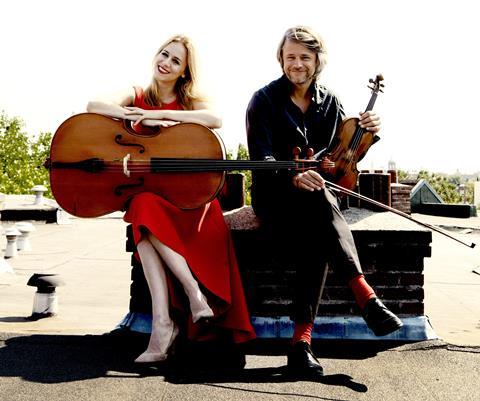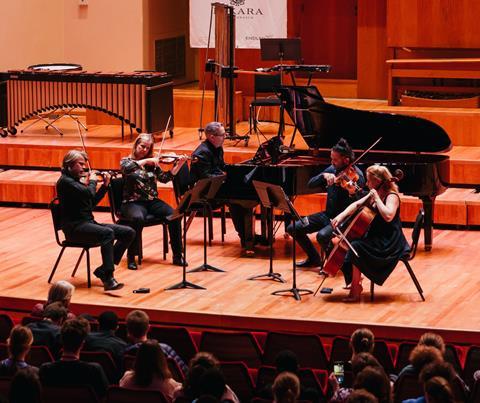The 2024 Stellenbosch International Chamber Music Festival (SICMF) is now underway, taking place at Stellenbosch University in the Western Cape of South Africa. Long-time faculty member violinist Daniel Rowland and cellist Maja Bogdanović share their experiences and favourite memories of the festival

Discover more Featured Stories like this in The Strad Playing Hub
Daniel Rowland
I first met pianist and SICMF artistic director Nina Schumann through performing chamber music together in Portugal, and we really clicked. She told me about where she lived in Stellenbosch – about the amazing mountains and the colour of the sunset, like a dream – and that she was in the process of setting up a festival there. Once it was up and running, she’d said she’d like to invite me. I was quite happy, but you know, often people say that and nothing happens. But sure enough, about a year and a half later, I received a long mail from Nina saying the first festival had been a success, would I like to come to the second festival? And so, in 2005, I went.
It was absolutely mind-blowing. The scale and the intensity are almost crazily ambitious, but in the best possible way. You have all these elements: the unparalleled beauty of the Western Cape’s nature, the incredible acoustic of the Endler hall, the facilities, the hospitality and warmth of everyone around Stellenbosch, and the almost off-the-charts enthusiasm of the students. It’s the warmest welcome you’ll get anywhere in the world, coming onstage with the audience already reacting as if you just gave the ultimate performance, and you haven’t even played one note yet!
This passion really carries you to artistic heights because you feel so welcome. Musical things happen there that actually shouldn’t be possible – normally you would say that two rehearsals of a challenging work are not enough, we can’t do it, but because of the sheer positive energy and all of these elements, somehow the impossible becomes possible. I’ve heard and been part of some of the most exciting and beautiful performances anywhere there. You also have a very interesting mix of musicians: some of the very finest European and American musicians, and then some wonderful local South African musicians, so you have this coming-together which is truly unique.
Everyone has their personal highlights. I remember encountering the Bochabela String Orchestra from Bloemfontein, South Africa, and the kids blew me away with their passion: I’ve never been asked to sign violin cases 15 times in a row, but there it happened. In 2009 my beloved mentor Ivry Gitlis came to the festival, and beyond the incredible memories of everything onstage and the reaction of the kids and the audience, I remember visiting a cheetah sanctuary together. I remember Ivry standing face to face with the cheetah, getting emotional looking at the expressive eyes of this ferocious beast that somehow, in its wildness and power, looked a little bit like Ivry himself. By then was already he was well into his eighties, but he was young in spirit, and one of the most colourful and authentic musicians I’ve ever known.
Over the last 20 years, SICMF has become a festival comparable with the major festivals around the world. Things have gotten a little bigger and smoother, but that original energy hasn’t changed. The scale and the level of artistry has really been astonishing in the last few years, with some big names that are a testament to its growing reputation.
It really has this glamour factor: if you fly somewhere far away from your normal life, that’s already something special, but when this whole university is bathed in sunshine, it seems almost too beautiful to be to be true. Such a madly enthusiastic and warm audience is something I would travel to the moon to play for, so I’m very happy I only have to travel to Stellenbosch – and the steaks are much tastier there than on the moon, so that’s another thing too!

Maja Bogdanović
My first time at SICMF was in 2022, and I was immediately struck by the very warm-hearted audience and faculty, and the incredible amount of young energy. I’ve never seen such audience – never anywhere in the world! The moment we stepped onstage it was an amazing feeling, like playing a rock concert.
My first concert was very touching, because it was the first festival since the pandemic. We opened with a very emotional piece, and as we played pictures unfurled from the ceiling of the people that were dear to the festival that had died. It was very powerful. On a happier note though, it was a celebration of fantastic music and friendships, all of us happy to see people we hadn’t seen for a while. A highlight for me from that festival was performing ‘Violoncelles, Vibrez!’ by Giovanni Sollima with cellist Peter Martens, it was a very rock’n’roll end to the faculty concerts!
Every festival is unique in its own way, but it’s rare to see this energy elsewhere in this amount: I was very impressed with the number of students and the atmosphere, as I’ve taught many masterclasses in Europe, but I’ve never seen so many people so curious and hungry to learn. I feel it’s sometimes more difficult in Europe to get students interested, maybe because everything is available and they take it for granted. But here they come from all over the continent and beyond, and that is very special to see. Some of them I saw again when I returned to perform with orchestras in South Africa, and so we’ve stayed connected somehow.
It’s never easy to play in front of students, because you’re teaching them what to do and then you have to demonstrate. It’s not the easiest task, but it goes two ways, because that responsibility gives so much energy. I love these side-by-side projects where you learn from each other – the younger and, let’s say, the more experienced.
I can’t choose what I’m most excited for in this next festival, but basically all of the concerts and classes. Daniel and I are playing in the South African premieres of Caroline Shaw’s Blueprint, Osvaldo Golijov’s Ever Yours, and Olli Mustonen’s Toccata for piano, string quartet and double bass. I’ll also be giving a public masterclass again.
South Africa is like a wonderland to me. I know it has its difficulties, but somehow at the end, everything works despite that. I remember when the electricity failed and everybody had to play in the hallway, but it sounded great! Everybody was dancing and having fun, it was really nice to see. Coming from Serbia, which has had a difficult past too, it pushed me back in time in a nostalgic way, but I think South Africans get the best out of it with lots of fun and humour. When you’re in difficult situation, just turn it into something positive and fun.
INTERVIEW BY LAUREN WESLEY-SMITH
The 2024 Stellenbosch International Chamber Music Festival runs from 5–14 July at Stellenbosch University in Stellenbosch, South Africa. Find more information here
Read: Back like a phoenix from the ashes: the Stellenbosch International Chamber Music Festival
Read: Postcard from South Africa - ‘What It Takes: Double Bass’
Discover more Featured Stories like this in The Strad Playing Hub
The number one source for playing and teaching books, guides, CDs, calendars and back issues of the magazine.
In The Best of Technique you’ll discover the top playing tips of the world’s leading string players and teachers. It’s packed full of exercises for students, plus examples from the standard repertoire to show you how to integrate the technique into your playing.
The Strad’s Masterclass series brings together the finest string players with some of the greatest string works ever written. Always one of our most popular sections, Masterclass has been an invaluable aid to aspiring soloists, chamber musicians and string teachers since the 1990s.
American collector David L. Fulton amassed one of the 20th century’s finest collections of stringed instruments. This year’s calendar pays tribute to some of these priceless treasures, including Yehudi Menuhin’s celebrated ‘Lord Wilton’ Guarneri, the Carlo Bergonzi once played by Fritz Kreisler, and four instruments by Antonio Stradivari.













































No comments yet